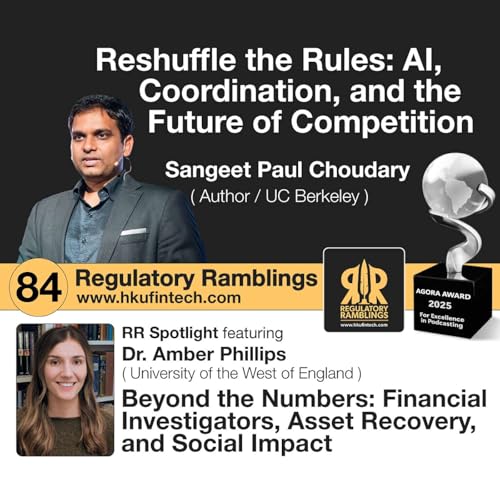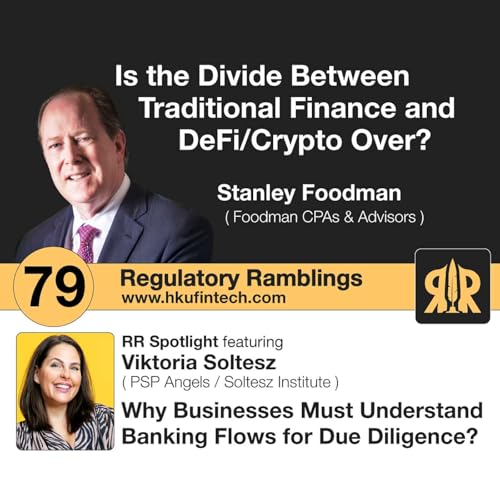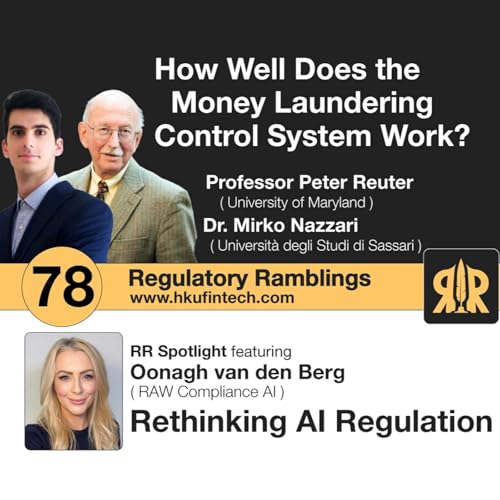Episode 83 with Sangeet Paul Choudary and Amber Phillips 🎧
We explore two critical frontiers shaping the future of compliance, risk, and governance - from the fight against financial crime to the systemic impact of artificial intelligence.
Spotlight: Amber Phillips on Asset Recovery and Financial Investigators
We begin with Dr. Amber Phillips, Senior Lecturer in Criminology at UWE Bristol, who shines a spotlight on the often-overlooked heroes of financial crime enforcement: accredited financial investigators (AFIs). Amber explains why AFIs are indispensable under the UK Proceeds of Crime Act and how their work extends beyond financial crime into everyday policing. She challenges the misconception that technology will replace human expertise, arguing instead for integration between investigative skills and emerging tech.
Amber also introduces her concept of the “Fifth D” - Destination - in asset recovery, emphasizing that success isn’t just about disruption or deterrence, but about where confiscated money ultimately goes. We discuss why stripping criminals of assets can be a more effective deterrent than custodial sentences, and why measuring success requires moving beyond headline figures to consider social impact and community reinvestment. For Amber, asset recovery is a story - not a statistic - and its ethical dimension matters as much as its financial one.
Sangeet Paul Choudary on AI as a Technology of Coordination
In the second half, we turn to Sangeet Paul Choudary, Thinkers50 Strategy Award winner and author of Reshuffle: Who Wins When AI Reshapes the Knowledge Economy. Sangeet reframes the AI debate, arguing that its true power lies not in intelligence but in coordination - acting as the “glue” that binds fragmented systems and redefines economic architecture.
He dismantles common myths about AI as mere automation or efficiency, showing how it changes the logic of competition, governance, and value creation. From financial services to global platforms, Sangeet explains why legacy integration is a coordination challenge, why efficiency metrics mislead, and why firms must rethink workflows and business models rather than bolt AI onto old structures.
We explore concepts like coordination without consensus, the coordination paradox, and the migration of value from execution to orchestration - where “above-the-algorithm” work becomes the new premium. Sangeet also highlights the enduring human advantage: judgment, curiosity, and narrative - the ability to frame questions and curate meaning in a machine-mediated world.
Why This Episode Matters
Whether you’re a compliance professional, a financial investigator, or a business leader navigating AI adoption, this episode offers practical insights and strategic foresight. From turning “bad money into good” to re-architecting workflows for an AI-driven economy, Episode 84 is a deep dive into the forces reshaping risk, regulation, and relevance.
The Regulatory Ramblings is an award-winning podcast, honored with the Agora Award for Excellence in Podcasting, bestowed by the Compliance Podcasting Network for its outstanding contribution to thought leadership in compliance and fintech.
The podcast is brought to you by The University of Hong Kong’s Reg/Tech Lab (Building Better Financial Systems), HKU-SCF FinTech Academy, Asia Global Institute, and HKU-edX Professional Certificate in FinTech, with support from HKU Faculty of Law. The program is led by Douglas Arner and hosted by Ajay Shamdasani.
For more details and resources, visit: hkufintech.com/rr
HKU FinTech is the leading fintech research and education in Asia. Learn more at www.hkufintech.com.
 1 h et 19 min
1 h et 19 min Nov 26 202554 min
Nov 26 202554 min 1 h et 12 min
1 h et 12 min Oct 29 20251 h et 6 min
Oct 29 20251 h et 6 min 1 h et 11 min
1 h et 11 min 1 h et 12 min
1 h et 12 min 1 h et 22 min
1 h et 22 min Sep 3 20251 h et 8 min
Sep 3 20251 h et 8 min
